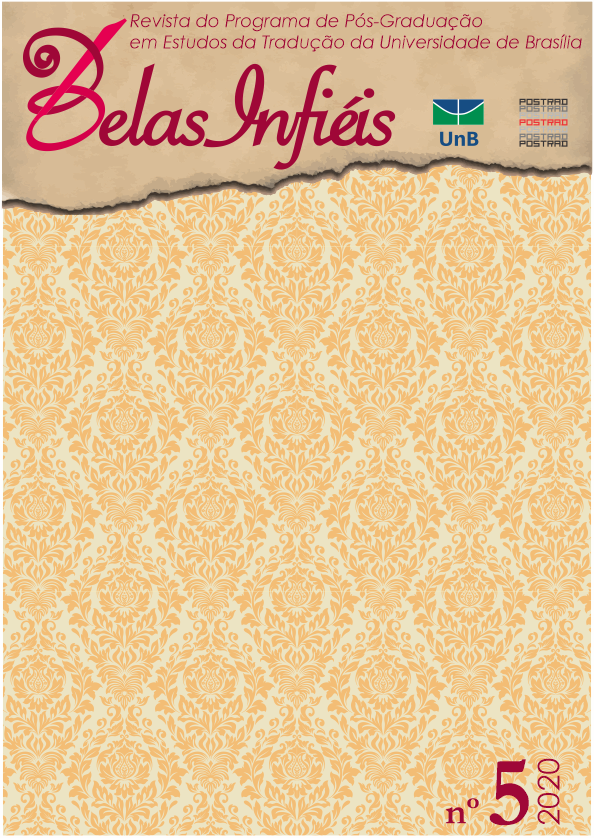Travelling through the emotions: staging the erotic
DOI:
https://doi.org/10.26512/belasinfieis.v9.n5.2020.29635Keywords:
Embodiment. Encounter. Connectedness. Emotional Response. Sensualism. Performance.Abstract
This article discusses translation for performance as a humanist endeavour driven by the desire for connection with otherness. Drawing on the ideas of Gabriel Marcel, Georges Bataille and Slavoj Žižek, among others, it describes stage translation in terms of a nostalgia for the absent human, as a mode concerned with restoring lost connectedness, a continuance of being that goes beyond the confines and constraints of the rational. In that sense, it argues that there is something that is common to the promise held out by translation and erotic experience alike. In the final analysis it maybe that what ignites that promise is the contrast to self-possession, the antidote to our discontinuous mode of existence as defined and separate individuals.
Downloads
References
Textos do Corpus
GARCÃA LORCA, Federico. Five Plays. Traduzido por: James Graham-Luján e Richard L. O’Connell. Harmondsworth: Penguin, 1965.
GARCÃA LORCA, Federico. Obras completas. Madri: Aguilar, 1980.
GARCÃA LORCA, Federico. Blood Wedding. Traduzido por: David Johnston. Sevenoaks: Hodder & Stoughton, 1988. Tradução de: Bodas de Sangre.
GARCÃA LORCA, Federico. In Search of Duende. Traduzido por: Christopher Maurer. Nova Iorque: New Directions, 1998.
GARCÃA LORCA, Federico. Play and Theory of the Duende. Traduzido por: A. S. Kline. Disponível em: http://www.poetryintranslation.com/PITBR/Spanish/LorcaDuende.htm. 2007a. Acesso em: 12 jul. 2016. Tradução de: Juego y Teoría del Duende.
GARCÃA LORCA, Federico. Blood Wedding. Traduzido por: A. S. Kline. Disponível em: http://www.poetryintranslation.com/PITBR/Spanish/BloodWeddingActI.htm. 2007b. Acesso em: 12 jul. 2016. Tradução de: Bodas de Sangre.
GARCÃA LORCA, Federico. Four Major Plays. Traduzido por: John Edmunds. Oxford: Oxford World Classics, 2009.
DE MOLINA, Tirso. The Lady Killer of Seville and His Graven Guest. Traduzido por: Michael Kidd. Disponível em: http://www.outofthewings.org/db/play/el-burlador-de-sevilla/translations#tr226. 2004. Acesso em: 12 jul. 2016. Tradução de: El burlador de Sevilla y convidado de piedra.
Obras Citadas
AGAMBEN, Giorgio. Homo Sacer: Sovreign Power and Bare Life. Traduzido por: Daniel Heller-Roazen. Londres: Meridian, 1998. Tradução de: Homo sacer: Il potere sovrano e la nuda vita.
BARTHES, Roland. The Pleasure of the Text. Traduzido por: Richard Miller. Nova Iorque: Hill and Wang, 1975. Tradução de: Le plaisir du texte.
BATAILLE, Georges. Death and Sensuality. A Study of Eroticism and the Taboo. Traduzido por: Mary Dalwood. Nova Iorque: Walker and Company, 1962.
BENJAMIN, Walter. The Work of Art in the Age of Mechanical Reproduction. In: ARENDT, Hannah (ed.). Illuminations. Trans. Harry Zohn. New York: Schocken Books, 1969. p. 211-244.
BENTLEY, Eric. The Life of the Drama. Nova Iorque: Atheneum, 1964.
BERMAN, Antoine. Translation and the Trials of the Foreign. Trans. Lawrence Venuti. In: VENUTI, Lawrence (ed.). The Translation Studies Reader. London: Routledge, 2000. p. 276-289.
EAGLETON, Terry. Literary Theory. An Introduction. Oxford: Blackwell, 1983.
FAUCONNIER, Giles; TURNER, Mark. The Way we Think: Conceptual Blending and the Mind’s Complexities. Nova Iorque: Basic Books, 2002.
FREUD, Sigmund. The Uncanny. In: STRACHEY, James (ed.). The Standard Edition of the Complete Psychological Works, Vol. XVII. Londres: Hogarth Press, 1955. p.219-252.
HANSSEN, Beatrice (ed.). Walter Benjamin and the Arcades Project. Londres: Continuum, 2006.
HARE, David. Writing Left Handed. Londres: Faber, 1991.
JOHNSTON, David. Translating the Theatre of the Spanish Golden Age. A Story of Chance and Transformation. Londres: Oberon, 2015.
KELLY, Stephen. Introduction. In: JOHNSTON, David; KELLY, Stephen (eds.). Betwixt and Between: Place and Cultural Translation. Newcastle-upon-Tyne: Cambridge Scholars, 2007.
MARCEL, Gabriel. Journal Métaphysique. Paris: Gallimard, 1928.
MARCEL, Gabriel. Creative Fidelity. Traduzido por: Robert Rosthal. Nova Iorque: Fordham University Press, 2002.
MARCUSE, Herbert. One-Dimensional Man. Studies in the Ideology of Advanced Industrial Society. Abingdon: Routledge & Kegan Paul, 1964.
MATICH, Olga. Erotic Utopia. The Decaddent Imagination in Russia’s Fin de Siècle. Madison: University of Wisconsin University Press, 2005.
MORRISON, John M. Lost in Translation: Why Have We Declared War on Foreign Dramatists. The Guardian, 1º set. 2010. Disponível em: http://www.theguardian.com/stage/theatreblog/2010/sep/01/lost-translation-war-foreign-dramatists. Acesso em: 6 set. 2020.
HARDWICK, Charles. Semiotic & Significs: The Correspondence Between Charles S. Peirce & Victoria Lady Welby. Bloomington: Indiana University Press, 1977.
RABINOWITZ, Peter J. Before Reading: Narrative Conventions and the Politics of Interpretation. Ohio: Ohio State University Press, 1987.
SPENCE, E. F. Our Stage and its Critics. 1910. Disponível em: http://www.gutenberg.org/files/13408/13408-h/13408-h.htm.
STATES, Bert O. Great Reckonings in Little Rooms: On the Phenomenology of Theater. Berkeley: University of California Press, 1975.
TURNER, Victor. Betwixt and Between: The Liminal Period in Rites de Passage. In: TURNER, Victor. The Forest of Symbols: Aspects of Ndembu Ritual. Ithaca: Cornell University Press, 1967. p. 93-111.
VALERY, Paul. Poésie et pensée abstraite. In: NEMIROVSKY, Irene. Oeuvres, Tome 1. Paris: Pléiade, 1957.
YEATS, W. B. The Collected Poems of W. B. Yeats. Ware: Wordsworth Editions, 1994.
ZITO, Angela. Body. Material Religion: The Journal of Objects, Art and Belief, v. 7, n. 1, p. 15-25, 2011.
ZIZEK, Slavoj. Enjoy Your Symptom. Jacques Lacan in Hollywood and Out. Londres: Routledge, 1992.
Downloads
Published
How to Cite
Issue
Section
License
Copyright (c) 2020 CC BY

This work is licensed under a Creative Commons Attribution 4.0 International License.
Given the public access to this journal, the texts are free to use but requires the recognition of the original authorship and initial publication in this journal to be properly stated.
 The journal allows the use of works published for non-commercial purposes, including the right to submit the work to publicly accessible databases. Published contributions are the sole and exclusive responsibility of the author(s).Â



















